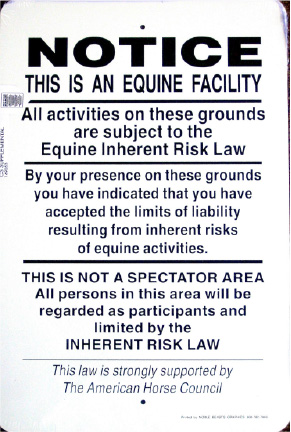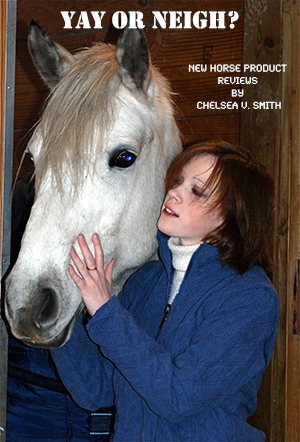What is the Word? Horse Boarding Biz Smarts

When you started your work as a horse-riding instructor and developed a clientele and a business, you probably envisioned hours of fun spent with horses. Shows, clinics, time in the center of the ring with adoring loyal students bouncing about around you. Horses in and out of your barn and your life. You probably didn’t think too much about the legal side of the business, your liability or your talent off the horse in the realm of running a business.
Most people are good hearted and kind. However, despite the best-laid plans and intentions, bad things can happen. Even with the best will in the world you cannot eliminate the necessity for backing up your verbal word with the written word. People can become upset when their horse is hurt or their child suffers an injury. Either you or they may simply forget what the original agreement actually entailed. We are all fallible.
A verbal agreement is enforceable in a court of law, but a written agreement is a far wiser choice. It can eliminate not just a visit to the courthouse, but keeps your business transparent and on track and will help you sleep at night. Contracts should be clear, concise and as simple as possible so they can be easily understood. They should contain no ambiguity and be signed by all relevant parties. Copies of the contracts should be provided to all parties once executed.
This article is intended to offer some sage advice based on my years of experience in the equine industry but I am not a lawyer, so please consult an attorney with any questions.
When Do I Need A Contract?
Wherever money is concerned you should have a contract. Wherever you undertake responsibility for another individual or equine you should have a contract, regardless of whether it is a free lease or free help riding horses or working around the barn be that paid or unpaid internships, barter services or employment.
Obviously if you run a boarding/training/lesson operation then you should have a boarding agreement that details the services you will provide and their cost. If you take a security deposit (which is a good idea), it should spell out when the deposit will be refunded and under what terms. It should state under which state/town jurisdiction any matter of lien or lawsuit must be filed. It should include a detailed description of the horse concerned, the ownership, insurance, and liability responsibilities. The best way to create this document is to consult an attorney. However, if you are working on a tight budget, you can often borrow the verbiage from a colleague or poach one online. Be sure that it is comprehensive.
 It is a good idea to have a list of barn rules posted in a high visibility spot and to include a copy as part of all agreements. This can be noted in the agreement as an attachment. This way if someone does not follow the barn rules as a boarder for example, then you can utilize their indiscretion as a reason to turf them out of the barn e.g. behavior dangerous to others.
It is a good idea to have a list of barn rules posted in a high visibility spot and to include a copy as part of all agreements. This can be noted in the agreement as an attachment. This way if someone does not follow the barn rules as a boarder for example, then you can utilize their indiscretion as a reason to turf them out of the barn e.g. behavior dangerous to others.
If you buy or sell a horse have a contract that spells out the details of the purchase. It should include price, terms of sale, names and addresses of all relevant parties. If you are selling a horse you should include ‘as is’ and ‘where is’ in the sale terms. It should also indicate there are no warranties express or implied, and state that there are no liens or encumbrances on the horse given this is the case. Also be sure to include the state/town jurisdiction for any lawsuit.
Employment contracts are very useful. You can indicate the scope of the work you want completed which provides a valuable means for terminating employment if you become unhappy with an individual who is not doing their job. The hours and pay can be indicated, which removes any ambiguity for the employee.
Liability waivers are also essential. Whoever visits your property should complete a waiver of liability, whether they are riding or not. The possible exceptions would be your vet or other health professional or farrier. Other professionals generally have their own insurance. All children under 18 should have their waivers completed by a parent or legal guardian. Be sure to include emergency contact numbers on the waivers and file them neatly away. Again, consult an attorney if necessary to ensure comprehensive and legally enforceable verbiage.
How Can You Successfully Resolve Disputes?
Disputes will occur. This is a natural part of doing business and no-one is immune from the occasional dispute popping up and spoiling their day, or week.
The best approach is to engage and communicate with your upset party immediately. Stay calm and avoid any inflammatory language or aggressive body posture. Simply ask them to explain their issue.
Perhaps your client is concerned that their horse is losing weight and blames you for not providing enough hay; perhaps your client is upset that their horse is not progressing quickly enough in their training; perhaps a horse you sold has gone lame and the purchaser claims you knew of the lameness. Whatever the issue, the first course of action should be to listen to the complaint. You do not have to address the complaint right away. Step away and think about it. Do not act in temper or when you are upset. We have all been wrongfully accused and sometimes rightfully accused by others, of not acting as they expected or completing a task. Do not become emotional. Think of it as if you are training a horse or rider. You cannot expect them to understand you better because you shout your aid or command at them instead of communicating calmly and succinctly. It is prudent to take time to properly evaluate the issued complaint and formulate your best response to remedy the situation.
Fix It
Be honest and transparent when you address the complaint. If you failed to do something then admit it and fix it. If the complaint is erroneous then explain your position. Do not be drawn into long-winded explanations and do not conduct the conversation in front of others. Privacy is important for all concerned. With your written contract in hand, you can point out any discrepancies or misunderstandings that have occurred.
In the event that your ‘upset party’ will not let the matter go and seeks legal advice then you must do the same. Bear in mind as a company (L.L.P., L.L.C., or Corporation) you cannot defend yourself in court in most states and thus must employ counsel. At times you may wish to consult an attorney and request they send a letter on your behalf outlining your position. This can sometimes eradicate any further issues and is a powerful deterrent in some situations.
Don’t Escalate
It is only human that we feel the need to explain ourselves to others especially if we are wrongfully accused of doing something. The quickest way to envelope yourself in a mire of unprofessional bog is to take to social media to defend yourself. If your ‘upset party’ has utilized the social media channels to accuse you of some misdemeanor it is very hard to ignore it but ignore it you must! If messages appear on your page/wall then simply delete them. If posts appear in groups or other pages you can ask the company to remove them on your behalf.
Do Not Be Petty
It is easy to be drawn into petty disputes, especially if you overhear bad gossip about yourself or your horses or students. Do not be prey to the whims of others. Always act as a professional and stay above the barn gossip or nonsense spoken at the rail at the horse show. It is hard to take criticism but if it is constructive then you can utilize it to improve yourself. Negative input from others can do you no harm unless you choose to allow it to do so, so be confident in your own abilities and at all times conduct yourself with integrity. If you don’t engage, then hurtful comments and divisive conversation will have no effect.
Signage Around Your Barn
In addition to written documents for transactions and services you can add signage around your barn to aid you in keeping things straight. Some insurance companies will require you include notices with barn rules, no smoking, the requirement for wearing protective headgear, keep dogs on a leash etc. Other signage can be fun and will encourage folks to sweep the aisle, coil the hose or shut the gate. Humorous signs work very well. Signage can be a great reminder, but don’t post endless signs everywhere or people will feel overwhelmed by rules and regulations.
In conclusion conducting your business successfully will always rely on your integrity and a good measure of common sense. You want to keep your clients happy and your reputation stellar. All horse people are busy and it is all too easy to ignore the paperwork side of the business. By keeping good records and contracts, and filing them diligently away for future use, you will protect your bottom line and your reputation. While lawsuits can and do happen regardless of a contract being executed, you will provide your counsel with good ammunition to protect you in a court of law with a well-written contract. Do not be shy to contact an attorney, many offer quite reasonable rates to review or create these documents.



